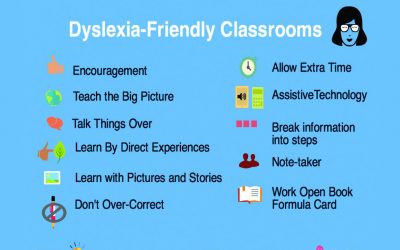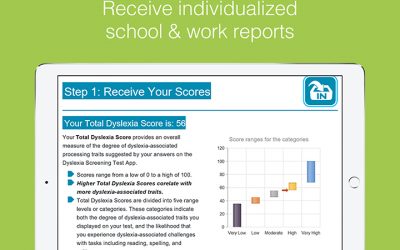Perhaps because dyslexia is already woefully under-identified in today’s schools, the expressive language aspects of dyslexia have taken a back seat in the schools as well as by researchers. Yet, on a daily basis, it may be helpful for dyslexic children and adults to know that expressive difficulties they may indeed be associated with dyslexia. In fact, knowledge about oral expressive language difficulties and dyslexia dates back at least to Samuel Orton in 1925. For those who would like to read more about this point from speech language pathologists, read HERE. A typical pattern is for preschoolers to have some mild noticeable difficulties in speech intelligibility. Error patterns may be corrected and a student is discharged from speech therapy. By the time a student reaches […]
PUTTING A NAME ON IT: Dyslexia, Dysgraphia, and Dyscalculia
The school year begins and then there's a lull. The first days of excitement and change are past and now teachers are trying to figure out their students and students are trying to figure out their teachers. Now is a good time for students to talk to their teachers...
Dyslexics Needs to Meet the Demands of the Future
CNBC had a welcome article about how important dyslexic employees are for increasing demands for creative thinking, design, and leadership. Their review was based on the Ernst and Young research paper The Value of Dyslexia. Excerpt: "dyslexic individuals have...
Dyslexia and the Undercover Billionaire
"Take chances. Take risks. Don't be afraid of what's around the corner. Embrace it." - Glenn Stearns New on Discovery Channel is an 8-part series based on a real-life wager. Glenn Stearns is a super successful billionaire who overcame life hurdles like growing up in...
Why Printed is Better Than E-Books – College Students
Dr. Jean-Luc Velay was kind enough to share his paper called E-book reading hinders aspects of long-text comprehension for adults with dyslexia. The paper's an important read as there is substantial evidence that reading on a screen and reading a printed book is not...
Becoming More Resilient [Premium]
In one recent study of gifted students with LDs, the most common characteristic was FRUSTRATION. Gifted dyslexics and dyslexic students in general are more frustrated than lower IQ peers with low reading achievement and it is easy to see why. Despite high intelligence and creativity, they may have little opportunity to showcase their strengths and have trouble with the most basic building blocks of education – reading, writing, and math. Strengths that may potentially help their situation include things such an ability to reflection on oneself (metacognition), ability to problem solving, and strong verbal comprehension skills. 1. Talk to Yourself in the Third Person Talking to yourself by your name instead of saying “I ” or “you” has been shown to have more powerful positive […]
READING FLUENCY: Phrase Cueing [Premium]
Once students have made significant progress with single word decoding, reading fluency practice can be rolled into reading practice with phrase cueing. HERE is a nice review of reading fluency approaches that includes a discussion of phrased reading. Phrase scooping or cueing involved the drawing of scoops underneath groups of words that go together in parts of a phrase. Combining scooped words with choral reading or echo reading can help students get practice with both reading and listening for phrases. Intervention Central has a Phrase Cued Text Generator, but it’s so-so. It’s better to break sentences into 3-6 word phrases to increase the ease of reading. From Steve Peha, check out the example below: Of course these shorter phrases also help with reading on a […]
INTERVIEW: Dr. Brock Eide & the Neurolearning Dyslexia App
After writing The Dyslexic Advantage and co-founding this non-profit, why did you decide to create this innovative dyslexia screening app? After 20 years working in this field it's become clear that the biggest problem facing dyslexic people is access. That includes...
Chat with Jack Churchill, Winston’s Great Grandson & Co-Founder of SCANNING PENS
Jack Churchill, Winston Churchill's great grandson also graciously took time out his busy schedule to talk with us about his wonderful scanning pens that are now taking the dyslexia world by storm. Scanning Pens is also one of Dyslexic Advantage newest sponsors - so...
MATH: The Problem of Showing Work [Premium]
If you live in a Common Core state and your student attends public school chances are they frequently are asked to “show their work”. There can be significant challenges for dyslexic students showing work because to do so requires a great deal of verbal working memory, word retrieval, executive function, and writing, all tasks that can overload each other. As with many curricula, the intentions and logic behind some of the choices seem reasonable; but also like many programs, the implementation has significant flaws so that students can become trapped in the process. Students must conform to a curriculum or fail rather than a curriculum being designed to meet the needs of students. For instance, math teachers Katherine Beals and Garry Garelick reviewed some of […]
In Their Own Words: Gifted Dyslexic Students in High School and University [Premium]
A research project recently interviewed gifted dyslexic students in high school and college and asked them about the ways they did and didn’t learn best. WHAT DIDN’T WORK – SCHOOL Copying Copying things over and over didn’t help with memorization. Reading Aloud Reading aloud in class was unhelpful and stressful. Reading Silently Class time to read silently wasn’t helpful because there weren’t easy ways to look up words and then students would lose their place. Reading with a Ruler Reading with a ruler didn’t help comprehension for one student,, but underlining with a pencil or highlighter did. Taking Away Extra Time Taking away extra time was very unhelpful. One teacher gave the student a watch to put on her desk, but the problem wasn’t being […]
Cultivating a LOVE of Reading
Q: Is it possible? A: Yes it is. The Cult of Pedagogy explored this topic from an opposite point of view, but the challenge is a formidable one, especially if a reader is dyslexic. GOOD THINGS TO DO Allow kids time to read for enjoyment. Let them choose their...

![Expressive Language Difficulties & Dyslexia? [Premium]](https://www.dyslexicadvantage.org/wp-content/uploads/2020/02/speech-bubbles-303206_640-pixabay-Expressive-Language-Difficulties-Dyslexia-400x250.png)




![Becoming More Resilient [Premium]](https://www.dyslexicadvantage.org/wp-content/uploads/2020/02/Becoming-More-Resilient-3-400x250.jpg)
![READING FLUENCY: Phrase Cueing [Premium]](https://www.dyslexicadvantage.org/wp-content/uploads/2020/01/phrase-craze-3-400x250.jpg)


![MATH: The Problem of Showing Work [Premium]](https://www.dyslexicadvantage.org/wp-content/uploads/2020/01/April-Newsletter-MATH-the-problem-of-showing-work-400x250.jpg)
![In Their Own Words: Gifted Dyslexic Students in High School and University [Premium]](https://www.dyslexicadvantage.org/wp-content/uploads/2020/01/naassom-azevedo-Q_Sei-TqSlc-unsplash_In-their-own-words-400x250.jpg)














